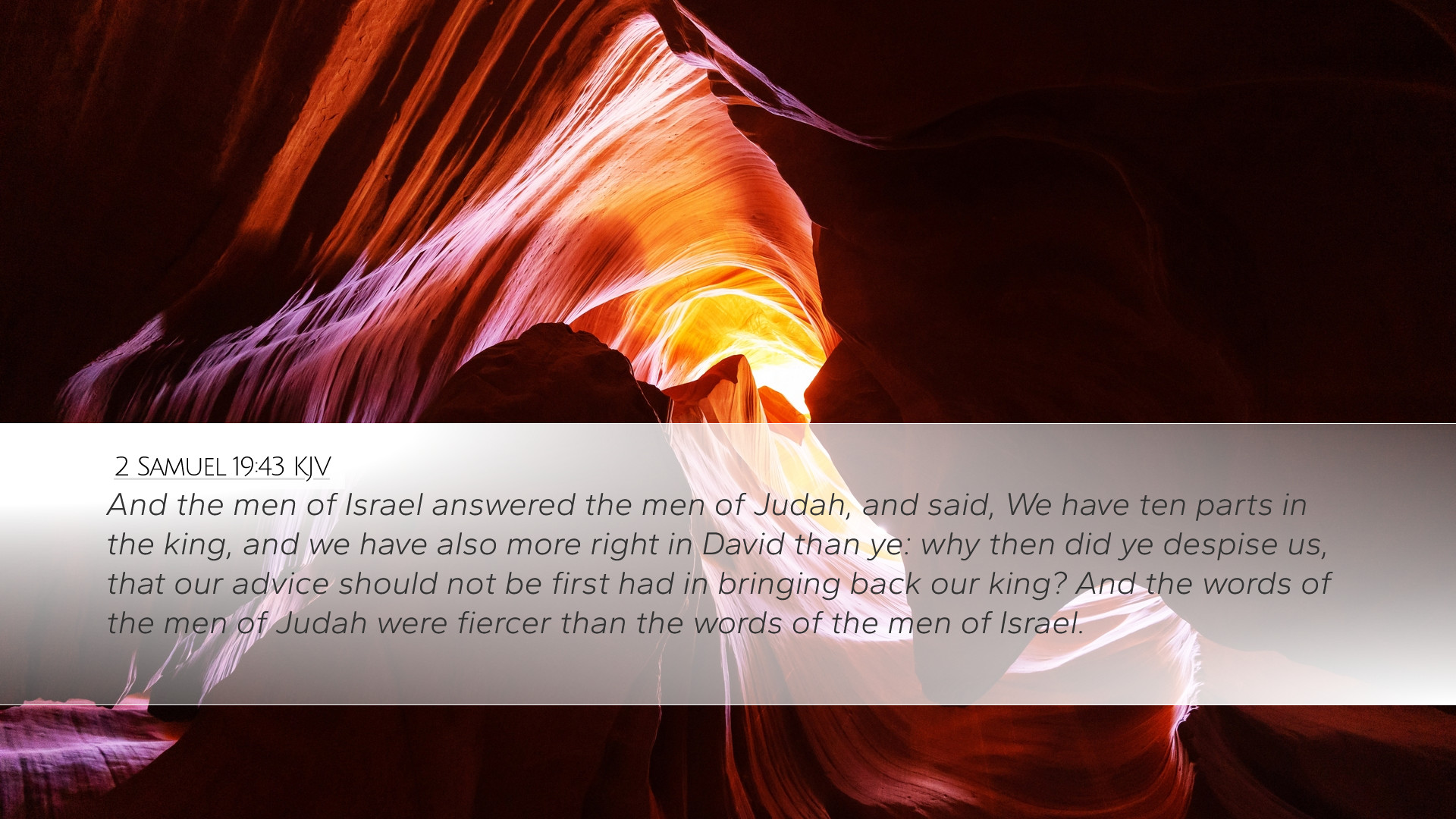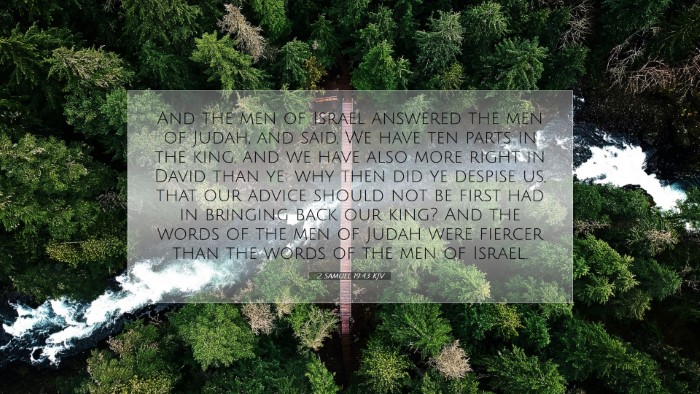Commentary on 2 Samuel 19:43
Verse Context
2 Samuel 19:43 reads: "But the men of Israel answered the men of Judah, and said, We have ten parts in the king, and we have also more right in David than you: why then did you despise us, that our advice should not be first had in bringing back our king?" This verse encapsulates the tension and rivalry between the tribes of Israel and Judah during the tumultuous period following Absalom's rebellion and David's return to power.
Exegesis of the Verse
This verse occurs in the narrative following the death of Absalom and the subsequent return of King David to his throne. The discourse here highlights the intricate dynamics of tribal loyalty and rivalry. The men of Israel feel a sense of disenfranchisement and resentment towards the tribe of Judah, claiming a greater stake in David's kingship.
Historical Context
The historical backdrop is significant. After a period of civil strife, David's restoration as king reveals underlying tribal divisions. Judah, being the tribe of David, had a natural claim of allegiance and loyalty, yet the men of Israel, representing the other tribes, contend for their rightful share and voice in the kingdom.
Insights from Matthew Henry
Matthew Henry emphasizes the emotional and political ramifications of the verses surrounding this dialogue. He notes that the men of Israel were struggling with their identity and perceived marginalization in the reign of David. Henry points out that their claim, “we have ten parts in the king,” illustrates not only their numerical superiority but also their expectation of equitable treatment in the governance of Israel.
Henry interprets their response as a manifestation of their insecurity, stating that it is common for those in power to overlook the voices from the periphery. The feelings of envy and jealousy are noted as key factors in the tense relationship between the tribes.
Insights from Albert Barnes
Albert Barnes brings attention to the practical implications of this dialogue. He elaborates on the issues of loyalty and representation within the kingdom. Barnes indicates that the men of Judah’s apparent boldness was met with a significant counter-claim from the men of Israel, suggesting that the national interest must be considered. He underscores the importance of unity and cooperation among the tribes for the stability of David's reign.
Moreover, Barnes reflects on the dangers of tribalism, warning that divisions can lead to contention and disputes that undermine a united front under David’s kingship. He notes that such divisions, if left unchecked, can resurface and challenge the king's authority.
Insights from Adam Clarke
Adam Clarke provides a detailed analysis of the socio-political implications of the verse. He notes that the reference to the "ten parts" aligns with the historical divisions within the nation. Clarke explains that while Judah had the emotional connection to David’s lineage, the other tribes felt disenfranchised, a sentiment expressed powerfully in this confrontation.
Clarke also addresses the phrase "despise us," suggesting that this indicates a deep-seated feeling of neglect among the tribes. He argues that this chapter serves as a warning about the fracture between the ruling class and the common people, pointing to the need for transparent governance and acknowledgment of the contributions from all tribes.
Theological Implications
This verse carries substantial theological implications regarding leadership, community, and conflict resolution. As David navigates these tribal dynamics, there is a call for humility and grace among leaders. The affront experienced by the men of Israel prompts a crucial reflection on how churches and organizations must strive to respect diverse opinions and foster unity among differing factions.
Lessons for Modern Leadership
- When leaders rise to power, they must remember the importance of inclusivity and representation.
- The handling of discord must be done not only with authority but also with compassion and understanding.
- Conflicts rooted in perceived injustices must be addressed with open dialogue to prevent long-term fragmentation.
Conclusion
2 Samuel 19:43 serves as a poignant reminder of the complexities of leadership and human relationships. The interplay of tribal loyalty, emotional wounds, and claims to authority echoes the struggles faced in any organization today. An examination of this text through the lenses provided by Matthew Henry, Albert Barnes, and Adam Clarke illuminates the necessity for leaders to foster unity and responsiveness to the diverse voices within their communities.


